Anja Hauth
MINERVA: Evaluating Complex Video Reasoning
May 01, 2025Abstract:Multimodal LLMs are turning their focus to video benchmarks, however most video benchmarks only provide outcome supervision, with no intermediate or interpretable reasoning steps. This makes it challenging to assess if models are truly able to combine perceptual and temporal information to reason about videos, or simply get the correct answer by chance or by exploiting linguistic biases. To remedy this, we provide a new video reasoning dataset called MINERVA for modern multimodal models. Each question in the dataset comes with 5 answer choices, as well as detailed, hand-crafted reasoning traces. Our dataset is multimodal, diverse in terms of video domain and length, and consists of complex multi-step questions. Extensive benchmarking shows that our dataset provides a challenge for frontier open-source and proprietary models. We perform fine-grained error analysis to identify common failure modes across various models, and create a taxonomy of reasoning errors. We use this to explore both human and LLM-as-a-judge methods for scoring video reasoning traces, and find that failure modes are primarily related to temporal localization, followed by visual perception errors, as opposed to logical or completeness errors. The dataset, along with questions, answer candidates and reasoning traces will be publicly available under https://github.com/google-deepmind/neptune?tab=readme-ov-file\#minerva.
Gemini 1.5: Unlocking multimodal understanding across millions of tokens of context
Mar 08, 2024Abstract:In this report, we present the latest model of the Gemini family, Gemini 1.5 Pro, a highly compute-efficient multimodal mixture-of-experts model capable of recalling and reasoning over fine-grained information from millions of tokens of context, including multiple long documents and hours of video and audio. Gemini 1.5 Pro achieves near-perfect recall on long-context retrieval tasks across modalities, improves the state-of-the-art in long-document QA, long-video QA and long-context ASR, and matches or surpasses Gemini 1.0 Ultra's state-of-the-art performance across a broad set of benchmarks. Studying the limits of Gemini 1.5 Pro's long-context ability, we find continued improvement in next-token prediction and near-perfect retrieval (>99%) up to at least 10M tokens, a generational leap over existing models such as Claude 2.1 (200k) and GPT-4 Turbo (128k). Finally, we highlight surprising new capabilities of large language models at the frontier; when given a grammar manual for Kalamang, a language with fewer than 200 speakers worldwide, the model learns to translate English to Kalamang at a similar level to a person who learned from the same content.
VideoPoet: A Large Language Model for Zero-Shot Video Generation
Dec 21, 2023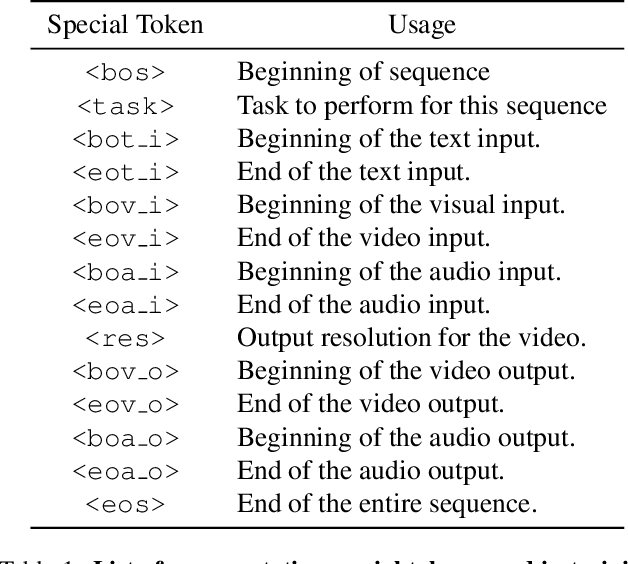



Abstract:We present VideoPoet, a language model capable of synthesizing high-quality video, with matching audio, from a large variety of conditioning signals. VideoPoet employs a decoder-only transformer architecture that processes multimodal inputs -- including images, videos, text, and audio. The training protocol follows that of Large Language Models (LLMs), consisting of two stages: pretraining and task-specific adaptation. During pretraining, VideoPoet incorporates a mixture of multimodal generative objectives within an autoregressive Transformer framework. The pretrained LLM serves as a foundation that can be adapted for a range of video generation tasks. We present empirical results demonstrating the model's state-of-the-art capabilities in zero-shot video generation, specifically highlighting VideoPoet's ability to generate high-fidelity motions. Project page: http://sites.research.google/videopoet/
Gemini: A Family of Highly Capable Multimodal Models
Dec 19, 2023Abstract:This report introduces a new family of multimodal models, Gemini, that exhibit remarkable capabilities across image, audio, video, and text understanding. The Gemini family consists of Ultra, Pro, and Nano sizes, suitable for applications ranging from complex reasoning tasks to on-device memory-constrained use-cases. Evaluation on a broad range of benchmarks shows that our most-capable Gemini Ultra model advances the state of the art in 30 of 32 of these benchmarks - notably being the first model to achieve human-expert performance on the well-studied exam benchmark MMLU, and improving the state of the art in every one of the 20 multimodal benchmarks we examined. We believe that the new capabilities of Gemini models in cross-modal reasoning and language understanding will enable a wide variety of use cases and we discuss our approach toward deploying them responsibly to users.
Learning Audio-Video Modalities from Image Captions
Apr 01, 2022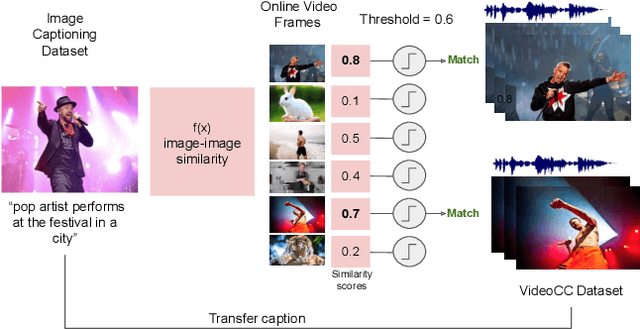
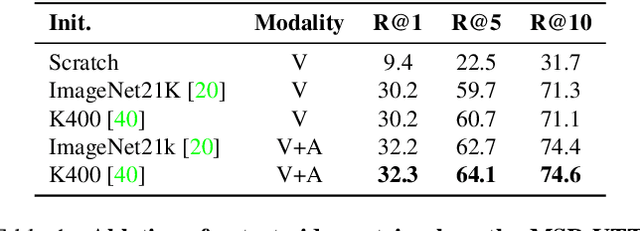
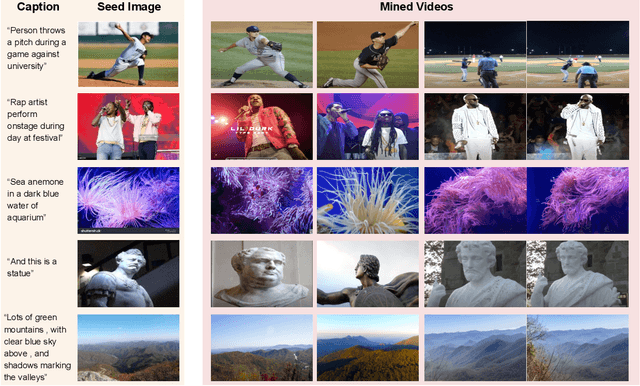
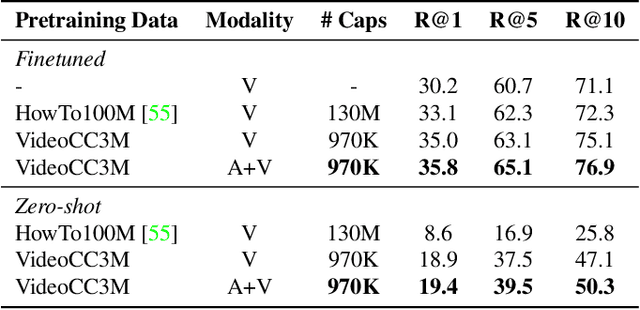
Abstract:A major challenge in text-video and text-audio retrieval is the lack of large-scale training data. This is unlike image-captioning, where datasets are in the order of millions of samples. To close this gap we propose a new video mining pipeline which involves transferring captions from image captioning datasets to video clips with no additional manual effort. Using this pipeline, we create a new large-scale, weakly labelled audio-video captioning dataset consisting of millions of paired clips and captions. We show that training a multimodal transformed based model on this data achieves competitive performance on video retrieval and video captioning, matching or even outperforming HowTo100M pretraining with 20x fewer clips. We also show that our mined clips are suitable for text-audio pretraining, and achieve state of the art results for the task of audio retrieval.
Fast Task-Aware Architecture Inference
Feb 15, 2019

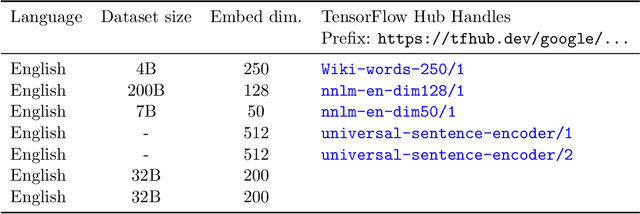
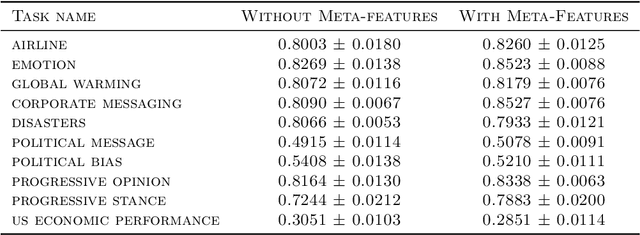
Abstract:Neural architecture search has been shown to hold great promise towards the automation of deep learning. However in spite of its potential, neural architecture search remains quite costly. To this point, we propose a novel gradient-based framework for efficient architecture search by sharing information across several tasks. We start by training many model architectures on several related (training) tasks. When a new unseen task is presented, the framework performs architecture inference in order to quickly identify a good candidate architecture, before any model is trained on the new task. At the core of our framework lies a deep value network that can predict the performance of input architectures on a task by utilizing task meta-features and the previous model training experiments performed on related tasks. We adopt a continuous parametrization of the model architecture which allows for efficient gradient-based optimization. Given a new task, an effective architecture is quickly identified by maximizing the estimated performance with respect to the model architecture parameters with simple gradient ascent. It is key to point out that our goal is to achieve reasonable performance at the lowest cost. We provide experimental results showing the effectiveness of the framework despite its high computational efficiency.
 Add to Chrome
Add to Chrome Add to Firefox
Add to Firefox Add to Edge
Add to Edge